Oh-Five!
I had never put the railways to practical use before. As I boarded the train into the city for the first time in order to attend university, the Manic Street Preachers' A Design For Life playing pleasantly, anthemically, in my headphones, that was the first manifestation of the attributes of a year that was going to prove to be a very different one to those past indeed. I can still remember sitting rather nervously in my first official lecture -- Politics 107 New Zealand Politics with Raymond Miller, in a small library basement theatre that did not have enough seats for all of the students. Not knowing any people in the class yet, it was a decidedly lonely experience, albeit a bearable one. The awkwardness was subdued briefly as a representative of the university debating club accused Raymond of being about to expose us to socialist republican propaganda throughout the course.The repeated train trips in and out of the city never grew loathsome at any point, despite the somewhat frequent delays. Taking a train is nothing like taking a bus. There is no manic acceleration and braking, no whiplash-inducing cornering and the vehicle doesn't continuously clip warning signs along the route of travel. People seem content to enjoy the peace and quiet provided by the more-than-adequate soundproofing. Not that I would usually be aware of their silence -- my music would be on, not too loud, but loud enough to mostly drown out the few environmental sounds. Compared to the agony of the bus commutes to high school over the past years especially, consistently taking the train has been a thoroughly enriching experience. It's not in many circumstances that one can be careening through the middle of suburbia and yet have the chance to have some quiet time to oneself. As an added bonus, one can be confident that one is doing the planet a favour by using clean mass transit.My enthusiasm for progressive music, particularly progressive rock, has become an extremely important part of my life as of this year and provided the soundtrack throughout, and I am convinced that it is set to become a life-long passion. After a lull in musical interest that had lasted a few years, brought on by my disenchantment with the less-than-meagre artistic offerings of the popular music industry, it has been intellectually, emotionally, and spiritually refreshing to find art that I feel I can relate to in terms of how I tend to think and feel. Pink Floyd lead me to discover Yes, early Genesis, Radiohead, Mike Oldfield, and the bubble of my aural diet is still expanding. It was with indescribable contentment that I entered the world of Sigur Rós earlier this year and began to have virtually inarguably some of the most spiritually uplifting experiences that I have ever had. Progressive rock, to me, conveys such a sense of depth that I do not see as apparent in any other medium.The political and sociological consciousness and understanding that I further accumulated throughout the year as a result of the great media, politics, sociology and anthropology classes that I took (as well as some of the bad ones) provided essential tools with which to comprehend the nature of the build-up to, and the aftermath of, the General Election -- probably the most hair-raising event of the year, so-to-speak. Like most people taking the same subjects as me, the results of this election were bound to be very important to me. It turned out that the ideological left got as best as they could have hoped for, considering the fact that the New Zealand public in general would appear to be becoming increasingly disenchanted with the Labour Party, and indeed with the opportunities to be represented by minor parties that are provided by the mixed member proportional system of parliamentary representation. In my opinion, Winston Peters has hardly been as disagreeable as was expected so far in his new role as foreign minister, despite the negative reflections provided by the media, rendering the longevity of the government as seeming somewhat more promising than it did in the beginning. Of course, it's great that Rodney Hide made it back into Parliament. In the end he is not so ideologically, nor characteristically, different to you and me, and he has genuine, good intentions. The tragic death of Rod Donald caused us to identify closer still with our noble politicians and united people of all ideologies in respectful, heartfelt grief. Let's make sure he is never forgotten. Likewise all those lives and livelihoods that were destroyed by the rampage of Hurricane Katrina; the sad inevitability that could so easily have been prevented with a bit more progressive thought and associated action.It was way back in the second week of the first semester of university, when tutorials for the majority of subjects began, that I started to enter into the social environment of university and my eventful and wonderous year was truly rendered so. Through the people that I met in tutorials, I came to know the caring, supportive, beautiful people that I know as my friends now. It was unlike anything I had ever experienced before to find so many good-natured people, all so tightly connected already, and yet so willing to welcome me into their circle with open arms. I had no idea just how socially cold my high school had been until I started university this year, which involved me taking on a distinctly new perception of humanity as I was at last exposed to people with whom I really do feel I have a lot in common, and by whom I feel I am genuinely liked. It has helped me learn a lot about myself and become the most comfortable with who I am that I have ever been in my life. I can't even begin to appropriately describe the value that I have found in true friends and warm smiles, but I would like to say thank you to everyone who has been there for me and included me in their lives throughout the year. Because you all really are what has made this year the best year of my life. The Year of Change and Progress.
Kiekie
 The Tawharanui Peninsula was claimed as Auckland regional parkland many years ago. However, only recently has a concerted effort been made to make it into an open sanctuary -- a "mainland island." The landscape in the area could be said to resemble something of a microcosm of the geography of New Zealand's North Island. It incorporates the elemental joys of long, white sandy beaches, solid dune formations, rolling hill country, open paddocks, rich underwater vestiges, towering cliffs and lush, healthy native rainforest. That is only part of the magic of the place.
The Tawharanui Peninsula was claimed as Auckland regional parkland many years ago. However, only recently has a concerted effort been made to make it into an open sanctuary -- a "mainland island." The landscape in the area could be said to resemble something of a microcosm of the geography of New Zealand's North Island. It incorporates the elemental joys of long, white sandy beaches, solid dune formations, rolling hill country, open paddocks, rich underwater vestiges, towering cliffs and lush, healthy native rainforest. That is only part of the magic of the place.
The park is located not far from the popular holiday home settlement of Omaha that is situated on the volatile Mangatawhiri Spit, and is barely a ninety minute drive away from Auckland -- but one wouldn't know it when one is there. For despite its relatively close proximity to the hustle and bustle of the city, Tawharanui feels as though it is as far away from anywhere as one can get. It helps that the side of the peninsula on which the camping ground is situated faces away from the city, out towards the alluring silhouette of Little Barrier Island.
Being there is an especially enjoyable experience when the wind is calm -- which allows one some relative peace and quiet in which to relax virtually unhindered -- as it indeed was from the morning of the twenty-fifth onwards. On that day the constant, disruptive tugging of the wind on the tent's Velcro window tabs and the whip-cracking sound of the ballooning roof finally ceased. It was a blessing. What little rain there was during the subsequent days was not an issue; if anything it was soothing. The absence of wind just seemed to slow the pace down so.
The dreams that I had during my periods of sleep at Tawharanui were vivid beyond description; of the sorts that stimulate long contemplative processes when one wakes up in the morning. Perhaps it was the no-doubt-therapeutic aural cocktail of the sounds of the bush and Pink Floyd and Sigur Rós that I listened to at bedtime that made me one very lucky oneironaut? Whatever the cause was, its effects also seeped over into my waking state. It's odd when one's restful daydreams begin to take on the almost psychedelic attributes of their nocturnal brothers and sisters.Much like its counterparts in the Hauraki Gulf, the "island" of Tawharanui has thrived and blossomed into an oasis of hope near the humming heart of the increasingly industrialised nation state of New Zealand. It is a haven for all manner of creatures, including the New Zealand dotterel, the pukeko, paradise shellduck, morepork, oystercatcher, wood pigeon or kereru, tui, bellbird, snapper, stringray and bottlenose dolphin, and also humans. It is with exquisite sensual and spiritual experiences such as Tawharanui that the individual may replenish their sanity in the midst of an otherwise insane world.
The Provisional End
As my last shift of wage labour at the supermarket began to draw itself to a close on Monday night, I found myself experiencing mixed feelings, much to my surprise. Throughout my time working there I had shown a tendency to focus intensively on all of the negative aspects of my state of employment -- receiving near minimum wage; having good uni days ruined by being required to spend several hours at wage labour in the latter parts; and the manipulative behaviour of the departmental manager. I had not gone to much depth at all to consider that every day I spent at work, during my term of employment of just over one year and seven months, was solidifying sentimental feelings towards the place.Ultimately, the produce manager has become the primary reason for my departure and also the other sixteen confirmed resignations that have occurred during the build-up to the Christmas week. This is largely due to the fact that he has consistently refused to allow anyone to make use of their three weeks' holiday pay, to which employees of a minimum of twelve months are legally entitled. In one case the manager even went so far as to lie to Joseph, a friend and former co-worker of mine, telling him that he had not accrued any holiday pay when in fact he had. The upper echelons of management have been informed and, hopefully, appropriate action should be taken against this perpetrator before long.But the manager's actions around this time of year are only the tip of a truly gargantuan iceberg. He has been cunning and manipulative of the workers ever since I was first employed there in May last year. It was not uncommon that the manager would change our rosters at his convenience, without consulting us first. This inevitably resulted in many of my shifts clashing with university classes. Whenever I requested that he sort these problems out, the manager would say that he would do it if I took it upon myself to find replacements for me during the conflicting shifts whilst he found a remedy, despite the fact that it was not at all my fault.The "end" result would usually be that he'd forget about me in his flurry of other work, and not make any effort to clean up his own mess in which I was caught up. I eventually stopped calling other workers to fill in for me on the shifts in question, and my would-be supervisors crossed off the shifts on my roster in recognition of the fact that neither I, nor a replacement, ever attended. The manager himself also came to acknowledge that I didn't work those shifts, because I couldn't. However, every single time he printed out new rosters throughout the year, he failed to edit the document in order to make it indicate that I was not rostered for the problem shifts. Me and my friends and former co-workers took it upon ourselves to amend any new roster when it was put up on the wall.One of the most disgraceful practices of produce management was their tactical selection of workers on public holidays. To put it as simply as I can, the legal fact is that any worker who is rostered to work on a given public holiday will receive time and a half, as well as be owed a day in lieu (essentially a holiday), if they turn up to wage labour. However, if a worker not rostered to work on that day is drafted over, they will only receive time and a half -- no day in lieu. This means that shifting other labour in, and forcing the normally-rostered workers out of the shift, is beneficial to the company as they aren't required to give the alternate workers as much money.In recognition of this loophole, management made a habit of making it a policy that workers for public holidays would be selected on a "first come, first served" basis. This ensured that a significant number of the workers on, say, a Queen's Birthday Monday, would not be ones usually rostered to work Monday -- and as such, the company would not end up in a position where it owed them days in lieu. It also ensured that most of the workers -- the more expensive workers -- who would usually be rostered to work on a Monday, would miss out. As a Monday evening worker, I was significantly affected by all of this. It turned out that for Labour Day -- of all days -- this year, the manager actually called around all of the workers that were not usually rostered to work Mondays and drafted them over to the Labour Day shift. He had actively swindled all of the workers involved, including the ones that had been unwittingly forced off the shift. I wasn't about to let the manager get away with this, so prior to the public holiday I explained the situation to Joseph who had, like me, been forced out of working Labour Day. Eventually the explaination spread around most of the department, and most people were now venomously aware of their rights and that they were being unethically ripped off.When Labour Day did come, much to my delight, everybody turned up -- not just the people who the manager had asked to work, but all of the more expensive workers that he had temporarily kicked off the shift as well. The result was that the department was around two hundred per cent overstaffed, with us for the most part just standing around with our hands in pockets, leeching money off of the company that had sought to fool us. Management had attempted to be as cost effective as possible, but the workers' actions and consciousness of the fact that we were being exploited meant it had backfired on them and a disproportionate amount of company money had been spent on that particular shift. That success is one very fond memory that I will hold with me for a long time to come.So in the end the fact is that the job that I complained about so much wasn't all doom and gloom after all. Certainly, the work itself wasn't exactly hard. I've also met some great people during my time there, such as mulleted Michael (also known as Whitey), and Joseph who I organised the protest action with. Anand deserves honourable mention for having been a loyal acquaintance since the very beginning and also for helping me by identifying a method by which I could pick up another two weeks' pay for free at the end. Aside from offering to provide me with certain raw materials for free, Chris has been an invaluable friend to me as of late, being the only remaining worker who can come close to equalling my raucousness. I expect to keep in contact with all of those individualsI can't truly do the numerous positivities of my experience of being employed at the supermarket much justice by simply writing about them here, at least without developing textual diarrhoea. It really is interesting to me that I feel that I have so much to say, though. I had never thought that I would actually get the sense that I'm going to miss my job. Nonetheless, I'm better off, now that I'm free of the governance of the produce manager, and to be quite frank, it almost was time to move on. But there is a conscious reason that I have hung in there at the supermarket for all of this time -- I am wary of the mission of settling into a new workplace. It's going to be a tricky transition. This will probably be my last entry for a few days as I'm off camping tomorrow -- I hope all have a good week.
It turned out that for Labour Day -- of all days -- this year, the manager actually called around all of the workers that were not usually rostered to work Mondays and drafted them over to the Labour Day shift. He had actively swindled all of the workers involved, including the ones that had been unwittingly forced off the shift. I wasn't about to let the manager get away with this, so prior to the public holiday I explained the situation to Joseph who had, like me, been forced out of working Labour Day. Eventually the explaination spread around most of the department, and most people were now venomously aware of their rights and that they were being unethically ripped off.When Labour Day did come, much to my delight, everybody turned up -- not just the people who the manager had asked to work, but all of the more expensive workers that he had temporarily kicked off the shift as well. The result was that the department was around two hundred per cent overstaffed, with us for the most part just standing around with our hands in pockets, leeching money off of the company that had sought to fool us. Management had attempted to be as cost effective as possible, but the workers' actions and consciousness of the fact that we were being exploited meant it had backfired on them and a disproportionate amount of company money had been spent on that particular shift. That success is one very fond memory that I will hold with me for a long time to come.So in the end the fact is that the job that I complained about so much wasn't all doom and gloom after all. Certainly, the work itself wasn't exactly hard. I've also met some great people during my time there, such as mulleted Michael (also known as Whitey), and Joseph who I organised the protest action with. Anand deserves honourable mention for having been a loyal acquaintance since the very beginning and also for helping me by identifying a method by which I could pick up another two weeks' pay for free at the end. Aside from offering to provide me with certain raw materials for free, Chris has been an invaluable friend to me as of late, being the only remaining worker who can come close to equalling my raucousness. I expect to keep in contact with all of those individualsI can't truly do the numerous positivities of my experience of being employed at the supermarket much justice by simply writing about them here, at least without developing textual diarrhoea. It really is interesting to me that I feel that I have so much to say, though. I had never thought that I would actually get the sense that I'm going to miss my job. Nonetheless, I'm better off, now that I'm free of the governance of the produce manager, and to be quite frank, it almost was time to move on. But there is a conscious reason that I have hung in there at the supermarket for all of this time -- I am wary of the mission of settling into a new workplace. It's going to be a tricky transition. This will probably be my last entry for a few days as I'm off camping tomorrow -- I hope all have a good week.
It's Just A Paper War
It's little more than a month after the conclusion of my first year of university, and my mum is already insisting that I should have decided on all of my courses for next year by today. Needless to say, the selection of what papers I am going to do is certainly not a process to be taken lightly. My choices will determine my academic route throughout the rest of my university life, with mum not wanting me to take more than three years to get my Bachelor of Arts degree, proclaiming that I will be cut off financially if I fail to meet the family's expectations.The diversity of the possibilities is virtually limitless -- at least, limitless enough to cause me some serious trouble. One choice I could make is simply to continue on with my media studies/politics double major, with a minor in sociology complementing it. That is the route that my mum and I sat down and planned out together, so it's all prepped and ready to be taken up. However, as many of you will know, I'm really not sure if I stand on favourable ground in terms of my opinions towards the media anymore.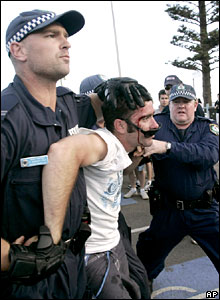 For me, the recent events in Australia have painted a clear picture of the sort of influence that the media has over the rest of society. The media does not so much reflect society as opposed to actually moulding and shaping society to disagreeable, very often corporate whims. In the case of Australia the media has played the role of perpetuating fear of difference for a long period and this has virtually directly resulted in the horrendous violence that has been occurring there since this time last week. Fear is the news media's middle name.Despite my stance, I still have aspirations of becoming a journalist -- it seems to be something within me that cannot be fought down. I feel as if I am supposed to make that particular "contribution" to society. But numerous people, including my parents, try to encourage me by saying that I could "make a difference," and I find that hard to agree with. Contrary to what some extraneous stories may suggest, the power of one is minute. Besides which, it needs to be taken into account that journalists are under the governance of their publication.In the end the fact is that the news companies are selling the information to an audience. They want this audience to be as broad as possible, and as such journalists are required to turn out palletable material that people of a wide range of ideologies can bear to read. The journalists' ideas are watered down so as to ensure the publication pulls a constant profit. There is also the unrealistic, but nonetheless aesthetically upheld in most circumstances, expectation that journalism should be as moderate or as neutral as possible. But there's no such thing as an absence of bias.
For me, the recent events in Australia have painted a clear picture of the sort of influence that the media has over the rest of society. The media does not so much reflect society as opposed to actually moulding and shaping society to disagreeable, very often corporate whims. In the case of Australia the media has played the role of perpetuating fear of difference for a long period and this has virtually directly resulted in the horrendous violence that has been occurring there since this time last week. Fear is the news media's middle name.Despite my stance, I still have aspirations of becoming a journalist -- it seems to be something within me that cannot be fought down. I feel as if I am supposed to make that particular "contribution" to society. But numerous people, including my parents, try to encourage me by saying that I could "make a difference," and I find that hard to agree with. Contrary to what some extraneous stories may suggest, the power of one is minute. Besides which, it needs to be taken into account that journalists are under the governance of their publication.In the end the fact is that the news companies are selling the information to an audience. They want this audience to be as broad as possible, and as such journalists are required to turn out palletable material that people of a wide range of ideologies can bear to read. The journalists' ideas are watered down so as to ensure the publication pulls a constant profit. There is also the unrealistic, but nonetheless aesthetically upheld in most circumstances, expectation that journalism should be as moderate or as neutral as possible. But there's no such thing as an absence of bias. The two directly news-related papers that I have sat this year -- Media Studies, and Politics of the Media -- have both brought me uncomfortably to the realisation that the media is not a good thing, in that it has completely changed the face of our society to suit the interests of profit. I am of the strong belief that all of us are significantly a construct of the ideas that we are exposed to through the media as opposed to legitimate soul-searching. As such I see the role of the media as immoral, and although I recognise I could be a part of it, I don't know if I could live with myself.Ultimately the question that I should be asking myself today as I make my decisions as to what papers I will take next year is, "what do I want to do for the rest of my life?" I feel unfavourably towards that question and towards the fact that I am sternly expected to have a career. I hope to enter into postgraduate study after I get my degree and as such I feel a need to focus on a specific area in my undergraduate years, and then carry that over into postgraduate. There is no sign of the freedom of the Bachelor of Arts that so many people cite as being there.Journalism is the only profession that I have truly aspired to at any time in my life and I virtually dreamed about it throughout my high school years. My teachers had constantly asserted that they thought I would make a good journalist. I had psyched myself up to become a journalist. It is all that I have ever known as a life goal, so it feels decidedly odd to be in a position now where I am considering casting it off. Many people scoff at my proposed alternative of joining the academic staff at the university. It certainly may be a less realistic aspiration than becoming a journalist, but the upside is I wouldn't have to become a walking contradiction of everything that I have come to believe.
The two directly news-related papers that I have sat this year -- Media Studies, and Politics of the Media -- have both brought me uncomfortably to the realisation that the media is not a good thing, in that it has completely changed the face of our society to suit the interests of profit. I am of the strong belief that all of us are significantly a construct of the ideas that we are exposed to through the media as opposed to legitimate soul-searching. As such I see the role of the media as immoral, and although I recognise I could be a part of it, I don't know if I could live with myself.Ultimately the question that I should be asking myself today as I make my decisions as to what papers I will take next year is, "what do I want to do for the rest of my life?" I feel unfavourably towards that question and towards the fact that I am sternly expected to have a career. I hope to enter into postgraduate study after I get my degree and as such I feel a need to focus on a specific area in my undergraduate years, and then carry that over into postgraduate. There is no sign of the freedom of the Bachelor of Arts that so many people cite as being there.Journalism is the only profession that I have truly aspired to at any time in my life and I virtually dreamed about it throughout my high school years. My teachers had constantly asserted that they thought I would make a good journalist. I had psyched myself up to become a journalist. It is all that I have ever known as a life goal, so it feels decidedly odd to be in a position now where I am considering casting it off. Many people scoff at my proposed alternative of joining the academic staff at the university. It certainly may be a less realistic aspiration than becoming a journalist, but the upside is I wouldn't have to become a walking contradiction of everything that I have come to believe.
Long Time Festering
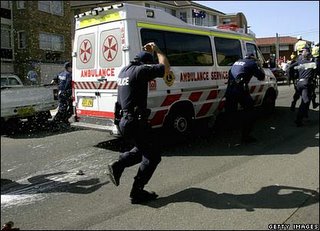 Racial violence erupts in Sydney do silently scream the headlines in newspapers the world over. It turns out that Sydney is full of racists after all. It turns out that the average Australian may well be more in line with their prime minister, John Howard, than one would have first thought. One could be forgiven for expecting more from the Australians, given that the country is so similar, culturally and socially, to New Zealand. However, these recent events have the potential to topple any preconceived notions of Australians' inherent good nature that have been held by many people until now.
Racial violence erupts in Sydney do silently scream the headlines in newspapers the world over. It turns out that Sydney is full of racists after all. It turns out that the average Australian may well be more in line with their prime minister, John Howard, than one would have first thought. One could be forgiven for expecting more from the Australians, given that the country is so similar, culturally and socially, to New Zealand. However, these recent events have the potential to topple any preconceived notions of Australians' inherent good nature that have been held by many people until now.
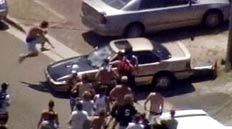 Many observers, including Sydney's hard-hit Islamic community, are citing the media as having played a significant role in the perpetuation of an underlying xenophobic mentality in Sydney. This article published by the University of Sydney a significant amount of time ago -- almost three years ago, in fact -- highlights the issue of the mainstream Australian media making links between ethnicity and crime. It, of course, would also serve to make it apparent that the negative media coverage is something that has been a problem for a long time. This week's events are being attributed to media-spawned racial tensions, as well as recent crime, finally reaching boiling point.
Many observers, including Sydney's hard-hit Islamic community, are citing the media as having played a significant role in the perpetuation of an underlying xenophobic mentality in Sydney. This article published by the University of Sydney a significant amount of time ago -- almost three years ago, in fact -- highlights the issue of the mainstream Australian media making links between ethnicity and crime. It, of course, would also serve to make it apparent that the negative media coverage is something that has been a problem for a long time. This week's events are being attributed to media-spawned racial tensions, as well as recent crime, finally reaching boiling point.
Although the violence commenced on Sunday, with a series of attacks on men and women of Middle Eastern appearance occurring at Cronulla beach in the south of Sydney, and the ransacking of an ambulance that was transporting five victims from the scene, it continues even now. Apparently, racist text messages have been circulating, one of which issues a declaration of war between Middle Eastern youths and Australians, and police are still struggling to control the atrocities that are being committed, including not just beatings but stabbings as well. Neo-fascist groups appear to be having a field day -- unabatedly, drunkenly expressing their hate.The text messages echo methods that were employed when the violence first began in Cronulla, which involved mobile phones being used to attempt to tactically organise the racist mobs. One report gave description to a text message that alleged Lebanese young people were attempting to escape from Cronulla via rail, and that they were assembling at the train station. Racists ran from the beach to the station, however faced only police resistance, with the text having been false and the police having been tipped off to it. Nonetheless it is absolutely disturbing that such efforts are being taken by the racists to optimise their obscene rampage.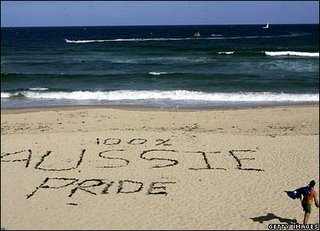 What is likely one of the saddest aspects of this situation is the fact that not all of the perpetrators of the violence are white supremecists as one would probably expect. A significant number of them appear to look little different to you and me. Of course, what sets us apart from them is that we have minds. However, it is tragic that such seemingly average, everyday people are becoming swept up in the xenophobic hysteria that is becoming ever more prominent in Western countries post-11 September, 2001. With extensive nationalism apparently on the rise, the only way to go from here for Australia is down.
What is likely one of the saddest aspects of this situation is the fact that not all of the perpetrators of the violence are white supremecists as one would probably expect. A significant number of them appear to look little different to you and me. Of course, what sets us apart from them is that we have minds. However, it is tragic that such seemingly average, everyday people are becoming swept up in the xenophobic hysteria that is becoming ever more prominent in Western countries post-11 September, 2001. With extensive nationalism apparently on the rise, the only way to go from here for Australia is down.
Wondering Around
 All of this widespread playing of StarCraft within recent days has caused me to get into a space phase. By a phase I mean one of those states where a certain something is one's main interest and the primary influence over many of the things that one does. In recognition of this I have been watching the BBC TV series Space, hosted by Sam Neill, that I have on video. It's a great series. I feel it really makes one appreciate our planet that we humans so often take for granted. At the same time it also draws one's attention to the fact that the planet is actually but a miniscule part of the Universe, serving to reinforce the odd feeling that Earth isn't ultimately all that there is to "life."
All of this widespread playing of StarCraft within recent days has caused me to get into a space phase. By a phase I mean one of those states where a certain something is one's main interest and the primary influence over many of the things that one does. In recognition of this I have been watching the BBC TV series Space, hosted by Sam Neill, that I have on video. It's a great series. I feel it really makes one appreciate our planet that we humans so often take for granted. At the same time it also draws one's attention to the fact that the planet is actually but a miniscule part of the Universe, serving to reinforce the odd feeling that Earth isn't ultimately all that there is to "life."
The other night, I was lying in bed watching Space whilst nursing my sunburn. Yes, I'm still suffering from it, even though it's been several weeks since it was inflicted upon me. Then I started thinking about how exactly I would have got my sunburn. The particular episode of Space that I was watching was about stars and how they are created. I ended up in a state where I was eerily conscious of the fact that our sun is a massive nuclear furnace and that, freakishly, the constant blaze of energy that it is producing is responsible for my injury. When any of us suffers a sunburn we are experiencing the side-effects of a faraway, monolithic nuclear reaction.
 Some other interesting food for thought is that eventually, Earth won't actually be here any more. It will be destroyed by the sun as it grows ever-larger with age, and that's only if the surface of the Earth isn't rendered uninhabitable by petty war or an asteroid strike before that time comes. It is possible that humanity will not have spread forth substantially, from the Earth and the solar system in which it is located, by the time one of those events happens. This is due to the fact that to do so would be a very difficult task. It's likely that the first colonies on other worlds will only be made up of a few overly privileged (overly skilled if you want to put it that way) individuals, and that a number of them are likely to be distanced subtly, but nonetheless significantly, from the "original" human strain as a result of genetic modification.
Some other interesting food for thought is that eventually, Earth won't actually be here any more. It will be destroyed by the sun as it grows ever-larger with age, and that's only if the surface of the Earth isn't rendered uninhabitable by petty war or an asteroid strike before that time comes. It is possible that humanity will not have spread forth substantially, from the Earth and the solar system in which it is located, by the time one of those events happens. This is due to the fact that to do so would be a very difficult task. It's likely that the first colonies on other worlds will only be made up of a few overly privileged (overly skilled if you want to put it that way) individuals, and that a number of them are likely to be distanced subtly, but nonetheless significantly, from the "original" human strain as a result of genetic modification.
So if it were to be the case that the human race, almost as we know it, was completely obliterated along with its homeworld planet Earth, what would this mean for the future of humanity in the Universe? And what would become of the vast numbers who had possibly moved onto some alternate, spiritual plane? It serves to boggle the mind that all traces of humanity and everything that it knew could have potentially been wiped off of the cosmic placard of the Universe, and yet our race could still very much be present in some other realm not of this Universe. Perversely, the thought almost crosses my mind that we could not in fact exist in such a state, without people being present in the physical Universe to believe in it. As far as the cosmos would be concerned, humanity would no longer be a part of it save for the physical energy derived from our bodies that would have been recycled back into the fabric of everything.
Here's some very good news that was broken yesterday on Hannah's sceneclog -- where you are probably likely to hear all hip music-related things first: the Icelandic progressive quartet Sigur Rós have, in seeming defiance of the preconceived expectations of me and undoubtedly many other people, announced that they are going to be playing a show in New Zealand next year on 17 April as a part of their international tour. It will be at the Saint James Theatre and I am already starting to imagine how absolutely mindblowing a show this is bound to be, enhanced by the great venue. I am somewhat ashamed to admit that one of my first thoughts after finding out about this was that it's going to sell out and I might be one of the unlucky individuals who doesn't manage to get a ticket. But then I stopped and realised that there is no way I'm ever going to let that happen. I was thinking just the other day that I might not ever get to see one of my utmost favourite bands play a show in New Zealand, due primarily to the fact that either they've broken up or they're all too famous to come down here and receive the only minor profit that a New Zealand show would likely afford them. I had virtually got it into my head that Sigur Rós was one such band that was too big for the little country. However, as it turns out they really are a cult band that would not forsake their fans in this part of the world, a country whose inhabitants most likely have more in common with the Icelandic people than any other state Sigur Rós have toured outside of Scandinavia. I can't begin to articulate how thoroughly happy and grateful I am about this.
I was thinking just the other day that I might not ever get to see one of my utmost favourite bands play a show in New Zealand, due primarily to the fact that either they've broken up or they're all too famous to come down here and receive the only minor profit that a New Zealand show would likely afford them. I had virtually got it into my head that Sigur Rós was one such band that was too big for the little country. However, as it turns out they really are a cult band that would not forsake their fans in this part of the world, a country whose inhabitants most likely have more in common with the Icelandic people than any other state Sigur Rós have toured outside of Scandinavia. I can't begin to articulate how thoroughly happy and grateful I am about this. But there's another thing that has crossed my mind that I feel may be perceived as somewhat odd. Part of the sheer magic of Sigur Rós is all of the mystery that exists within, and behind, the immense apparent depth of the music. The band members try to minimise the numbers of interviews that they open themselves to, so as to maintain an air of anonymity, or at least more of an air of anonymity than the other, more posturing rock stars that are all over the place in contemporary music. Vocalist and guitarist Jónsi Birgisson once said that people living outside of Iceland experience the band's music on a much more pure level, because less lyrics understood means more is left to the imagination. In this light, could a Sigur Rós live performance have the potential to remove a lot of the mystery surrounding the outfit, and to consequently sully the celestial trip that is lying in bed in the dark whilst listening to Svefn-g-englar or Viðrar vel til loftárása? The last sentence was certainly one of a concerned nature, in recognition of the fact that one must never omit the small factors for the mere reason that they are small. For they could turn out to be much, much bigger. Ponder it.
But there's another thing that has crossed my mind that I feel may be perceived as somewhat odd. Part of the sheer magic of Sigur Rós is all of the mystery that exists within, and behind, the immense apparent depth of the music. The band members try to minimise the numbers of interviews that they open themselves to, so as to maintain an air of anonymity, or at least more of an air of anonymity than the other, more posturing rock stars that are all over the place in contemporary music. Vocalist and guitarist Jónsi Birgisson once said that people living outside of Iceland experience the band's music on a much more pure level, because less lyrics understood means more is left to the imagination. In this light, could a Sigur Rós live performance have the potential to remove a lot of the mystery surrounding the outfit, and to consequently sully the celestial trip that is lying in bed in the dark whilst listening to Svefn-g-englar or Viðrar vel til loftárása? The last sentence was certainly one of a concerned nature, in recognition of the fact that one must never omit the small factors for the mere reason that they are small. For they could turn out to be much, much bigger. Ponder it.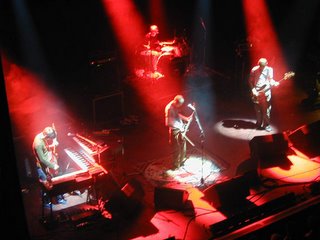 Despite the fact that there is that odd irking feeling of concern within me, it goes without saying that we are very lucky to have this incredible band coming to New Zealand. It really is the best thing that I, at least, could have hoped for, with Sigur Rós being my absolute favourite contemporary band. For those who attend the show, it will undoubtedly be something that they never wish to forget. I think it is apparent already that this is a show that would be better enjoyed not drunk, or intoxicated by any other substance, but rather experienced in the purity that Sigur Rós themselves have always intended. It is the music that will take you away on the night of 17 April. No augmentation necessary. That is the sheer magic of Sigur Rós.
Despite the fact that there is that odd irking feeling of concern within me, it goes without saying that we are very lucky to have this incredible band coming to New Zealand. It really is the best thing that I, at least, could have hoped for, with Sigur Rós being my absolute favourite contemporary band. For those who attend the show, it will undoubtedly be something that they never wish to forget. I think it is apparent already that this is a show that would be better enjoyed not drunk, or intoxicated by any other substance, but rather experienced in the purity that Sigur Rós themselves have always intended. It is the music that will take you away on the night of 17 April. No augmentation necessary. That is the sheer magic of Sigur Rós.
Who Set All These Lab Monkeys Free?
In an effort to combat the abundance of boredom that has the tendency to be brought forward by having nothing do -- and which, despite being contrary to what I probably often say, I must say I appreciate a great deal -- I have started playing StarCraft again for the first time in a long time. In fact it is probably several years since my last seriously avid stint. It's a great, although strange, sensation to have all those memories and feelings from intermediate school come flooding back.
 I've noticed that I can appreciate the storyline of the game much more now, too. Blizzard Entertainment, the creators of StarCraft, are well-known for their exciting and well-integrated narratives. It must not be easy to get it to function so well with a real-time strategy game. My new perceptions on the storyline are obviously reflective of the fact that the last time I was really into this game was back before 11 September, 2001, when I possessed virtually no political or sociological consciousness to speak of. I was blissfully unaware.
I've noticed that I can appreciate the storyline of the game much more now, too. Blizzard Entertainment, the creators of StarCraft, are well-known for their exciting and well-integrated narratives. It must not be easy to get it to function so well with a real-time strategy game. My new perceptions on the storyline are obviously reflective of the fact that the last time I was really into this game was back before 11 September, 2001, when I possessed virtually no political or sociological consciousness to speak of. I was blissfully unaware.
There is an organisation within the game known as the Kel-Morian Combine, an interplanetary mining coalition and renegade pirate group that operates outside of the law of the Terran Confederate government (that is, the main representation of human empire in the game -- they all have southern United States accents). One would expect the Combine to be in the bad books of the Confederacy -- not so however, because the pirates actually supply the dominant power with fuel and resources. As such, no military action is taken against them. Personally I can't help but draw parellels between that in-game scenario, and the real-life situation that exists in the relationship that the United States has with Saudi Arabia.
The case of the cracks forming in the culture of the highly spiritual, alien Protoss race also seem poignantly relevant. Since its inception, Protoss society had operated under a complex tribal system. Although this did afford extra significance to the members and specific cultures of individual tribes, some Protoss of the more recent generations saw it as an archaic and ancient tradition that had the potential to breed separatism and they sought to discard the tribal set-up in favour of a simple heirarchical caste system. The transition was not made, however, until post an extended period of tribal conflict known as the Aeon of Strife that resulted in the subjugation of many tribes' values. This seems to me, to almost mirror the forced real-world decline of religion being perceived as relevant to societal politics, particularly when one takes into account the fact that individual Protoss still refer back to their tribal ties, but merely for tradition's sake as opposed to practicality's sake.
Even if I am reading too much into all of that, I'm having a lot of fun doing it. I guess you'll only really get the relevance if you've played the game. I saw The Exorcism of Emily Rose at the cinema with Alison and Cynthia last night. Leitch made some interesting comments over at his space. I think that the motive of the narrative certainly was to encourage the viewer to question their beliefs; indeed, it made me think a lot. Not believing in angels and demons as such, but also not believing in the non-existence of a spiritual plane, I found it quite thought-provoking. At some points I found myself trying to refer back to my own spiritual beliefs as I thought it all over, however I was so immersed in the film that it was hard to stray from the path that it had set out, which I think is a credit to the director (sorry for omitting names here). There was also some very solid acting in the film, and Father More was portrayed endearingly. The casting really couldn't have been better.
Supergroup
It seems as though a lull has fallen over the blog circles, probably in light of the fact that it is somehow potentially more worthwhile to be outside, ruining one's eyes in the sunlight, than it is to be inside, ruining one's eyes in front of the computer screen. I know that I've been making a concerted effort to not spend too much time on the computer each day; this became a particularly important factor once the Internet hours started running down. There was also the issue to contemplate that sometimes, when I get off the computer, I really do feel as if I've achieved nothing within my several hours of browsing. The case of information overload contributes especially to this feeling. It all has it's upsides sometimes though. Time spent online can be rewarding, I admit.I've been thinking about this on and off for a few months after seeing a thread about it on the message boards at Prog Archives -- if you ever were to conceive of what you personally would believe to be the ultimate band, who do you think the members would be? It's a surprisingly hard question, I believe, having thought about it for a significant amount of time and still not yet come to a positively definitive conclusion. The difficulty of the task is accentuated by the Prog Archives regular's insistence at the time that no two band members that you select may originate from the same band. For me, this meant that I had to write out a lot of my favourite musicians, albeit I accept it at the same time because if the restriction were not in place, people would undoubtedly simply be doing things such as merging their two favourite bands together.There are a number of factors that it would pay for one to take into account when arranging their ultimate band, but probably the first thing that should be considered is what not to take into account. The most important aspect of the latter action is that one should not even bother to consider one's various chosen artists' social compatibility. Compatibility is, to put it simply, a practically incomprehensible part of the structure of a band, at least from the lowly fan's point of view, especially given all of the arrogant posturing that tends to go on. However, factors that one might want to consider include how the musicians' respective styles would complement each other in performance, and who would be the provider or providers of showpersonship on-stage.After much deliberation this is the "ultimate band" that I have come up with myself, however, as I said earlier on in the piece it is not any sort of official arrangement. Some very difficult decisions had to be made in selecting which members were going to be lined up, and which were not. Individual bands that are great appropriately have the tendency to contain several great musicians. In an advancement from what was done on Prog Archives I've listed the musicians with their name and original band (primary band if they have been members of multiple), which roles they will play in this particular band, and a song that I believe to effectively showcase the skills that I would wish them to put to use in my ultimate band. I'd be interested to see what line-ups other people come up with and hear what you think of mine. David Gilmour of Pink FloydElectric Guitar, Acoustic Guitar, Lead VocalsEchoesChristopher Squire of YesElectric Bass Guitar, Acoustic Guitar, Vocal HarmoniesYours Is No DisgraceJónsi Birgisson of Sigur Rós
David Gilmour of Pink FloydElectric Guitar, Acoustic Guitar, Lead VocalsEchoesChristopher Squire of YesElectric Bass Guitar, Acoustic Guitar, Vocal HarmoniesYours Is No DisgraceJónsi Birgisson of Sigur Rós  Bowed Electric Guitar, Alternative Lead VocalsViðrar vel til loftárása (Tk. 7 on Ágætis byrjun)Phil Selway of RadioheadDrums, PercussionParanoid AndroidTony Banks of GenesisPiano, Keyboards, Hammond Organ, MellotronThe Cinema ShowJohn Helliwell of SupertrampSaxophoneCrime Of The Century
Bowed Electric Guitar, Alternative Lead VocalsViðrar vel til loftárása (Tk. 7 on Ágætis byrjun)Phil Selway of RadioheadDrums, PercussionParanoid AndroidTony Banks of GenesisPiano, Keyboards, Hammond Organ, MellotronThe Cinema ShowJohn Helliwell of SupertrampSaxophoneCrime Of The Century
Petty Pity
 Rodney Hide's Thursday last week appears to have been a pleasant one. Evidently he spent a significant portion of it on the computer, turning out a total of six rivetting entries in one day, the more amusing of which was a valiant articulation of his "computer forensics" skills that allowed him to discover the decidedly odd name of a folder from which a Labour MP David Benson-Pope press release sprang forth. It seemed distinctly as though Rodney was making an attempt to contribute a new element of scandal to the proceedings in regards to the inquiry into Benson-Pope's behaviour treatment of students whilst he was a schoolteacher, an issue that he made sure to comment on slightly later in the day.
Rodney Hide's Thursday last week appears to have been a pleasant one. Evidently he spent a significant portion of it on the computer, turning out a total of six rivetting entries in one day, the more amusing of which was a valiant articulation of his "computer forensics" skills that allowed him to discover the decidedly odd name of a folder from which a Labour MP David Benson-Pope press release sprang forth. It seemed distinctly as though Rodney was making an attempt to contribute a new element of scandal to the proceedings in regards to the inquiry into Benson-Pope's behaviour treatment of students whilst he was a schoolteacher, an issue that he made sure to comment on slightly later in the day.
As if his Thursday wasn't fun enough, it would be fair to say that Friday held an even more exciting occasion for Rodney. He was keen to emphasise his thrill upon taking receipt of his newly-decorated and unsuitably-environmentally-friendly transportation device. The smart car is intended to serve as a billboard to rally support for Rodney's admirable electoral position, but ultimately of course it is a toy with which he can travel to the astoundingly numerous gun club meetings and gun shows that it would appear he chooses to attend throughout the average week. Funnily enough, one of Rodney's motives for going to those shows is most probably for the purpose of gaining votes.

Without delay Rodney received a generous flood of suggestions for potential personalised plates from his noble supporters, which included such intellectual jests as "PC FREE" and "IRDSUX." He appears to have been particularly impressed with the decidedly bland "4EPSOM," that he gave a prominent position in his entry on Monday, and indeed went as far as to introduce it into the publicised fray as an "UPDATE." Rodney also made sure to give mention to the fact that he took the smart car to a Sporting Shooters Association of New Zealand meeting and that it attracted a significant crowd. One wonders if the people were checking it out because it is so remarkably comical. A regular to Rodney's blog by the name of fairway pointed to the "nose ring" effect produced by the image of Rodney on the side of the car overlapping the side windows and vents. It is hard to forgive oneself for pondering lowly of Rodney's car, given that he is of course simply a great politician.
Rodney's visit to Carlson School for students with cerebral palsy was acknowledged admirably without literal mention of his vehicle, however it was to be expected that the smart car would not go completely ignored in this edition of Rodney's catalogue of his day-to-day activities. He posed with Ronnie, a cerebral palsy sufferer, in front of the smart car, most probably at Rodney's discrete insistence. "Cool wheels, both sets!" said blog regular Gunner in recognition of the position of prominence that the smart car receives in the photograph. It's probably among the most recent images published of Rodney's car before it was -- yes -- broken into a couple of days ago. You've 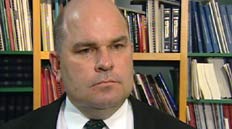 got to feel sorry for the guy. His very favourite component, the Navman iCN520 In-Car GPS, which is so awesome that its name deserves to be written in bold and at its full length every time, was taken. Without it Rodney may have nary a hope of finding the way to his various business visits. Dare I say it I'm sure he didn't expect this sort of misfortune to occur for him in Remuera!
got to feel sorry for the guy. His very favourite component, the Navman iCN520 In-Car GPS, which is so awesome that its name deserves to be written in bold and at its full length every time, was taken. Without it Rodney may have nary a hope of finding the way to his various business visits. Dare I say it I'm sure he didn't expect this sort of misfortune to occur for him in Remuera!
Laying Them Off
 The Engineering, Printing and Manufacturing Union has been reported to be taking action against Air New Zealand in an effort to save the jobs of a significant number of workers that are employed by the airline, but who have recently been told that they are going to be laid off as a result of cost-cutting moves of outsourcing being performed by the company. In recognition of Air New Zealand's apparent slipping commercial status, the increasing competitiveness emerging in the industry in the wake of the events of 11 September, 2001, and the fact that New Zealanders are more expensive to employ than many overseas workers, heavy aircraft maintenance roles are being outsourced to operations in other nations, primarily China.
The Engineering, Printing and Manufacturing Union has been reported to be taking action against Air New Zealand in an effort to save the jobs of a significant number of workers that are employed by the airline, but who have recently been told that they are going to be laid off as a result of cost-cutting moves of outsourcing being performed by the company. In recognition of Air New Zealand's apparent slipping commercial status, the increasing competitiveness emerging in the industry in the wake of the events of 11 September, 2001, and the fact that New Zealanders are more expensive to employ than many overseas workers, heavy aircraft maintenance roles are being outsourced to operations in other nations, primarily China.
As a result it can be expected that the six hundred and seventeen skilled New Zealand workers standing to lose their jobs are going to end up in a situation where it is substantially more difficult for them to put food on their families' tables. It also highlights a distinct attitude in the upper echelons of the company that it is very much the case that not much value ought to be placed on the individual situations of the workers. Undeniably, the airline is of national importance, being New Zealand's primary flag carrier within the industry, and as such it can be confidently said that its wellbeing must be maintained. However, it is also undeniable that this maintenance of corporate wellbeing must not be enacted at skilled workers' expenses.
It was identified, when this cost-cutting measure was first announced by company management, that Helen Clark had received documentation that would have rendered her aware of the airline's apparently-dire financial situation and the fact that it was planning to embark on the laying off of several hundred workers. This obviously put her and the only-just-confirmed Labour-led coalition government in an awkward situation in which they were expected to take some sort of action in the interests of New Zealanders, or at least to acknowledge the fact that the state of the company was partly the government's responsibility. The government, of course, bailed the airline out of a negative financial situation in recent years via buying a significant proportion of the company shares and rendering itself a majority shareholder.

Despite the perception being valid that the government's status in terms of its partial ownership of Air New Zealand should essentially afford to it a degree of responsibility in the maintenance of the company's viability -- particularly considering that the shares were purchased in the first place with that intention in mind -- it has been confirmed recently that the government is hesitant to take such a position. Deputy Prime Minister and Finance Minister Michael Cullen cites the reason for this hesitation as being a concern that numerous companies in New Zealand would be "lining up for restructuring" if such a helping hand were to be given to Air New Zealand in the (apparently mere) interests of protecting the company's engineers' jobs. This could be perceived as surprising, given that Labour governments past have already shown favourable feelings towards helping Air New Zealand, and that the airline's significance to the nation is widely acknowledged.One of the most displeasing aspects of this significant venture into sacrificial competitiveness in which Air New Zealand management is engaging is that the company has made the decision to explain to budding engineers studying under the support of Air New Zealand-funded scholarships that they are each now not guaranteed a job in the company's engineering division. Of course, the reason for the engineering students having to be told this is that their jobs are now destined to be handed over to Chinese workers who may well be made to carry out the same tasks as New Zealanders would have, but for a fraction of the cost to the company. It's exponentially unfortunate that this announcement of job position losses has come right at the end of the year; a year which many of the students will now, no doubt, feel has completely and utterly been put to waste.





















